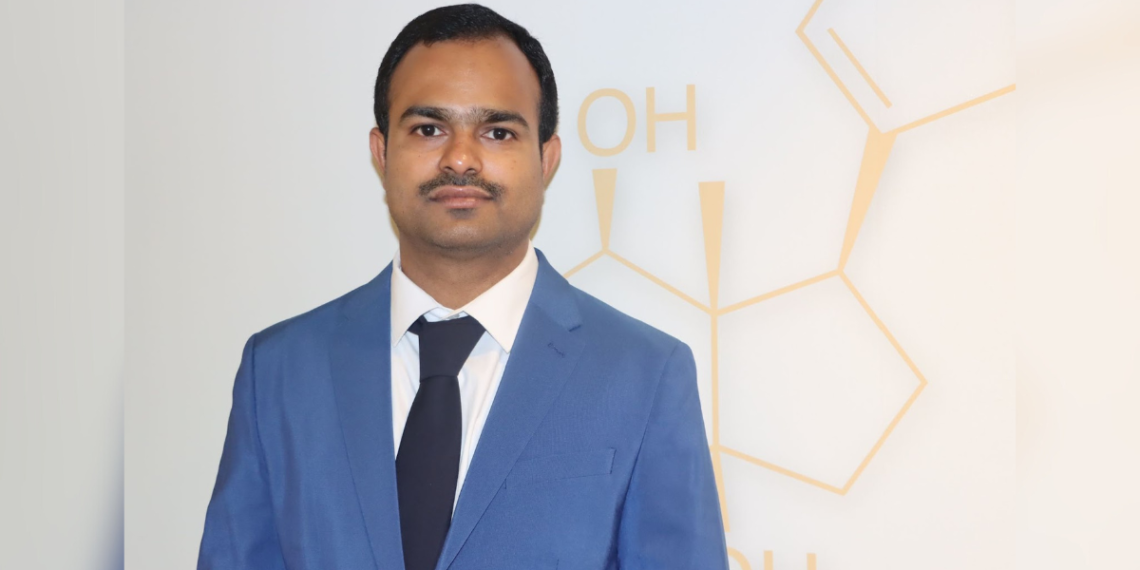Written by Anne Schulze
In the field of medicinal chemistry, tireless research and critical thinking often result in breakthroughs in cancer treatment. At Purdue University, Sudarsan Kasireddy, an associate research scientist in the Department of Chemistry, has made significant strides in this area through his multidisciplinary research. Committed to developing targeted therapies, Kasireddy is poised to transform cancer treatment and significantly improve patient outcomes.
Kasireddy’s extensive background in synthetic organic chemistry, medicinal chemistry, and chemical biology has equipped him with a unique perspective and skill set that he applies to his research. Leveraging his expertise in these disciplines, he strives to create more effective and affordable treatment options for cancer patients, driven by a passion for enhancing therapeutic efficacy.
Integrating Chemistry and Biology
Kasireddy’s research is both comprehensive and impactful, centered on the design of therapeutic agents that precisely target cancer cells while minimizing harm to healthy tissues. Under the mentorship of distinguished scientists including Dr. Indrapal Singh, Dr. Jiri Misek, Dr. Andrea Kasinski, and Dr. Philip Low, he has made substantial contributions to his field. His work encompasses the synthesis of bioactive molecules, carbohydrate-based compounds and the development of ligand-targeted therapeutic agents, including oligonucleotides aimed at regulating cancer-related genes.
Throughout his career, Kasireddy has demonstrated a remarkable set of skills and expertise. He is proficient in a range of analytical techniques, including NMR, LC-MS, UPLC, and HPLC, as well as molecular biology techniques such as Western blotting and PCR. His research accomplishments are reflected in numerous publications in high-impact journals and several provisional patents. He has successfully developed bispecific small molecules that selectively bind to tumor cells or immunosuppressive tumor stromal cells, labeling their surfaces with fluorescein. This innovative labeling technique enables CAR (Chimeric Antigen Receptor) T cells, engineered to bind fluorescein, to recognize and destroy the targeted tumor cells.
“My knowledge and enthusiasm for organic chemistry, coupled with my interpersonal skills, empower me to tackle new challenges in innovative biopharmaceutical companies such as Umoja Biopharma and AusperBio, where we actively collaborate on research,” Kasireddy explains.
His dedication to advancing cancer treatment is exemplified by his work on small molecule ligand conjugates that selectively deliver therapeutic agents to diseased cells. Notably, his research focuses on the targeted delivery of microRNAs, a field that has garnered significant attention and was highlighted by the 2024 Nobel Prize in Physiology and Medicine for its pivotal discoveries. By concentrating his efforts on enhancing therapeutic efficacy while minimizing side effects, he aims to improve patient outcomes and overall quality of life.
Educational Background and Experience
Kasireddy’s cancer research journey is built on a solid educational foundation. He holds a bachelor’s degree from Osmania University and a master’s in organic chemistry from SRTM University. “During my PhD at IIT Madras, I published six peer-reviewed research articles and received national and institute-wide awards for my thesis work,” he shares.
His postdoctoral experiences at Charles University in Prague and at Purdue University further developed his chemical biology and drug development skills, leading to his current role as an associate research scientist.
Focusing on Affordable Immunotherapy
At Purdue University, Kasireddy is dedicated to developing innovative, cost-effective immunotherapy treatments for diseases such as cancer. His pioneering work on bispecific small molecules opens new avenues for accessible cancer therapies by improving the precision and efficiency of CAR-T cell treatments, which selectively target and destroy cancerous tissues. In addition, he employs advanced chemical derivatization and forward genetic techniques to explore compounds that specifically target key genes responsible for driving disease progression, further advancing the field of affordable therapeutic interventions.
“As a synthetic medicinal chemist, I have contributed to multiple disease areas, including cancer and inflammatory diseases,” Kasireddy notes. “Understanding drug targets and mechanisms helps in designing and developing the next generation of diagnostics and therapeutics.”
He and his team assess the stability, solubility, cell permeability, and in vivo properties of synthesized compounds. They conduct proof-of-concept testing in mouse models and optimize promising agents for oral administration and dose response testing. This strategic approach enables them to identify effective and safe therapeutic candidates for further development.
Advancing Cancer Treatment
Kasireddy’s work is instrumental in advancing cancer treatment options. He is deeply committed to improving patient care by making these therapies more affordable and accessible.
“Science is always advancing,” Kasireddy reflects. “As we delve deeper into the complexities of cancer, I am confident that we will uncover ways to make these innovative therapies more accessible and affordable for everyone.”
Kasireddy’s research in medicinal chemistry at Purdue University plays a significant role in the ongoing effort to develop better cancer treatments. His work exemplifies the progress being made in the field and the immense potential for future advancements.





















